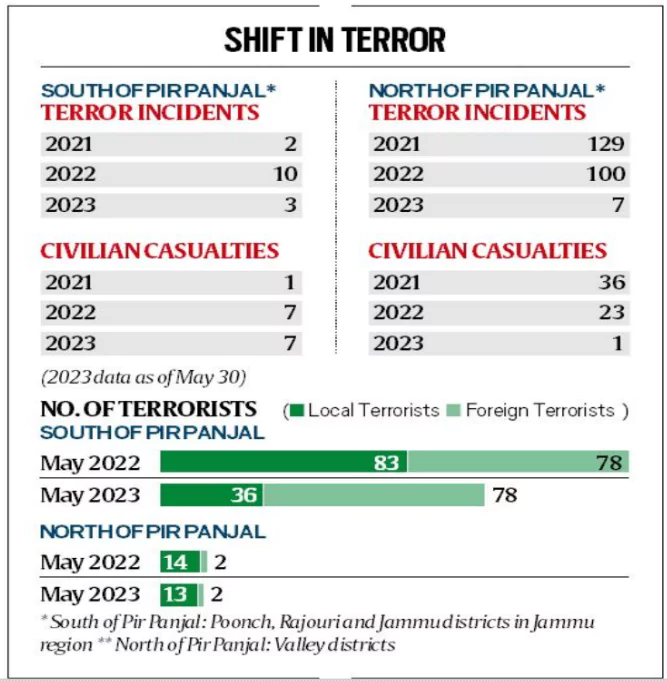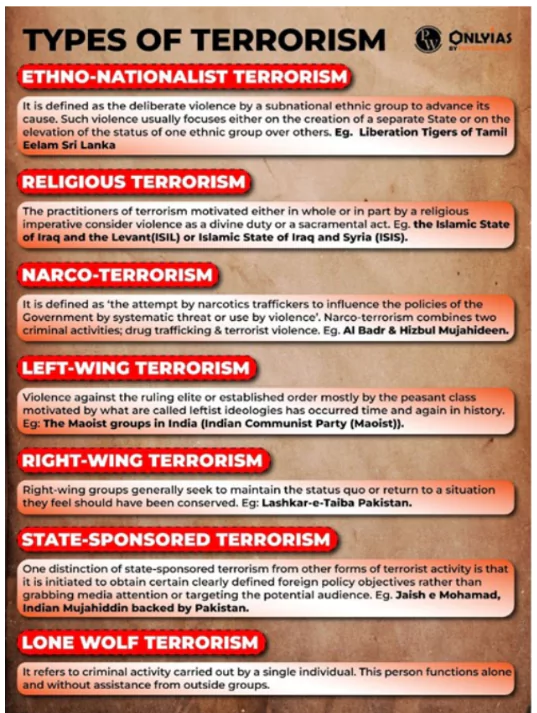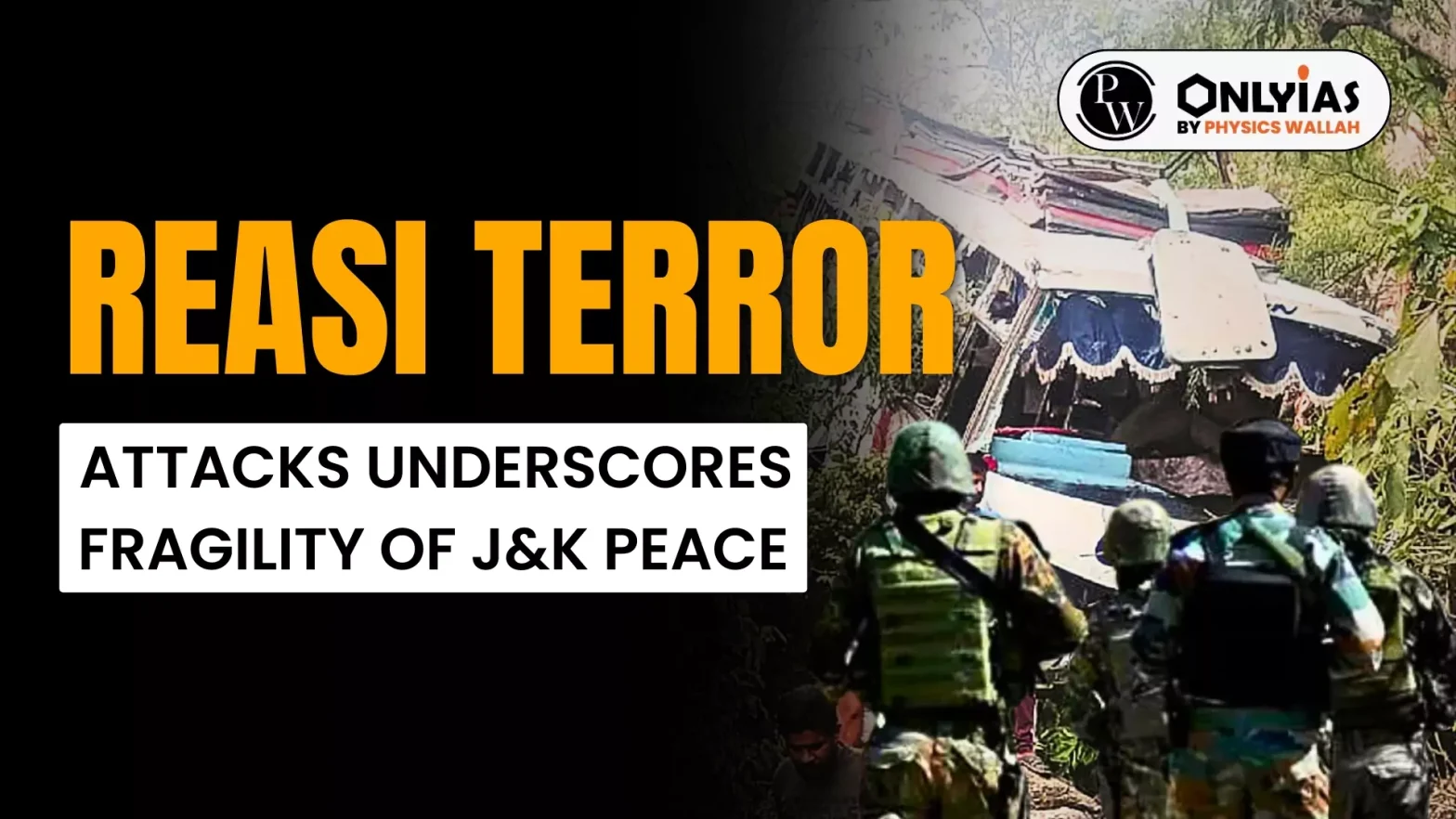Recently, a bus carrying pilgrims was ambushed by terrorists in the Reasi district of Jammu and Kashmir.
- Nine pilgrims were killed, and 33 were injured. The driver lost control of the bus, causing it to plunge into a gorge.
Reasi Terror Attacks
- Second Terror Attack on Pilgrims in the Area: The terror attack in Reasi’s Pouni area, near Rajouri district, is the second targeting of pilgrims there.
- In May 2022, a bomb planted by terrorists caused a bus from Katra to Jammu to catch fire, killing 4 Vaishno Devi pilgrims and injuring 24 other pilgrims.
- Expansion of Terror Attacks in New Regions: The recent terror attack highlights a potential expansion of terrorist activities into new regions, as the Reasi district had previously remained unaffected by the recent wave of attacks in the neighbouring districts of Rajouri and Poonch.
- Casualties: Since 2021, 38 soldiers and 11 civilians have been killed in militant attacks in Rajouri and Poonch districts.
Enroll now for UPSC Online Course
About Terrorism
Currently, there is no universal legal definition of terrorism.
- However, the Comprehensive Convention on International Terrorism (CCIT) defines terrorism as Any person commits an offence within the meaning of this Convention if that person, by any means, unlawfully and intentionally, causes:
- The Comprehensive Convention on International Terrorism (CCIT) is a proposed treaty aimed at criminalising all forms of international terrorism and cutting off terrorists, their financiers, and supporters from funds, arms, and safe havens.
- It was drafted by India in 1996, but is yet to be adopted by the United Nations General Assembly (UNGA).
|
-
- Death or serious bodily injury to any person; or
- Serious damage to public or private property, including a place of public use, a State or government facility, a public transportation system, an infrastructure facility or the environment or
- Damage to property, places, facilities, or systems resulting or likely to result in a major economic loss when the purpose of the conduct, by its nature or context, intimidates a population or compels a Government or an international organisation to do or abstain from doing any act.
Status of Terrorism in Jammu and Kashmir
- Decline Since Abrogation of Article 370: The Indian Home Minister noted a 66% decrease in terrorist incidents in Jammu and Kashmir since the abrogation of Article 370 in January.
- Resurgence of Terrorist attacks in Rajouri and Poonch: Reasi, Rajouri, and Poonch saw active militants during the 1990s but there was a containment of insurgency until 2021. Over the past three years, there has been a resurgence of Terrorist attacks in these areas.
- Strengthened counter-infiltration grid in the Kashmir Valley: may have redirected terrorist actions towards Jammu districts.
- Search for new battlegrounds: Unlike Rajouri and Poonch, Reasi is not close to the Line of Control (LoC), but security forces’ pressure in nearby districts may have prompted militants to seek new battlegrounds.
- Presence of Established Terror Networks:
- The Financial Action Task Force (FATF) conditions on Pakistan-led terrorist groups like Lashkar-e-Taiba (LeT) have forced them to operate through proxies to evade international scrutiny.
- The Resistance Front (TRF), a reported proxy group, claimed responsibility for a recent attack in J&K, as per J&K police records.
- In 2022, most militants killed in J&K belonged to either Lashkar-e-Taiba (LeT) or The Resistance Front (TRF), indicating the persistence of clandestine networks established over three decades.
- Concerns over New Infiltration of Terrorist Groups: Jammu and Kashmir police raised concerns about a rise in terrorist incidents in the valley, possibly linked to a newly infiltrated group.
Check Out UPSC CSE Books From PW Store
Reasons Behind Increased Terror Attacks In Jammu

- Thinning of Regional Forces: In 2020, Rashtriya Rifles (RR) units were relocated from Poonch, Rajouri, and Reasi districts to Ladakh reducing security presence and emboldening militants.
- Increased Army Operations in the Kashmir Valley: Terrorism’s focus has shifted to Jammu over the past three years due to increased Army operations reducing militants’ operating space in the Kashmir Valley.
- Challenging Terrain: The Jammu region’s vast and complex terrain has been exploited by Pakistan-based terror organisations to send armed terrorists across the International Border (IB) and LoC, occasionally using tunnels.
- Geography Advantage: The Pir Panjal range, spanning these districts, offers seasonal access to Pakistan-occupied Kashmir (PoK) through passes and provides militants with escape routes and attack launchpads.
- The recent Reasi strike, where militants ambushed a bus carrying pilgrims from a forest, underscores this operational strategy.
- Attempt to Derail the Upcoming Assembly Elections: A spike in terrorist violence across Jammu and Kashmir is seen as a calculated move to derail the upcoming assembly elections and spread fear among residents.
- High-Tech, Well-Trained Militants: The militants are using local phones and offline apps to communicate, making the security forces harder to track.
- Lack of Human Intelligence Network: Human intelligence is crucial in counter-insurgency operations. The absence of a strong network of informers remains a challenge as militants and their network of overground workers persist.
Measures Undertaken to deal with Terrorism in Jammu and Kashmir
- Broadening of Anti-terror Operations: Over the past four years, security forces in Jammu and Kashmir have broadened anti-terror operations to target entire terror networks and their financial support systems.
- Increased Use of Anti-Terror Laws: The use of laws like the Unlawful Activities Prevention Act (UAPA) and the Public Safety Act (PSA) has been a key strategy in cracking down on these networks.
- Efforts to Dismantle Over Ground Worker (OGW) networks: Efforts have focused on dismantling Over Ground Worker (OGW) networks accused of providing logistical support to militants.
- Constitution of the multi-agency Terror Monitoring Group (TMG) and the State Investigation Agency (SIA): The Jammu and Kashmir administration has constituted the TMG and SIA to counter-terrorism in the region. These agencies have cracked down on the Over Ground Worker (OGW) networks, leading to the arrest of over 1,900 persons accused of providing logistical support to militants.
- Constitution of Special Investigation Units (SIU) by Jammu and Kashmir Police: In 2022, the J&K police constituted Special Investigation Units (SIU) in each police district owing to a high pile-up of UAPA cases. The main idea behind this was to designate officers in every district to effectively investigate these cases and secure convictions in the courts.
- Expanded Security Measures: Security operations in Jammu and Kashmir have expanded significantly beyond physical encounters. Official records indicate a broadened scope that includes widespread detentions under security laws, enforcement directorate (ED) and tax raids aimed at disrupting alleged funding networks, and crackdowns on Overground Worker (OGW) networks and their connections.
- Emphasis on Community Support to Tackle Terrorism: Fostering trust and cooperation between local communities and security forces can facilitate effective intelligence gathering and early prevention of terrorist activities.
Check Out UPSC Modules From PW Store
India’s Framework To Deal With Terrorism

- Legislative Measures:
- Unlawful Activities Prevention Act (UAPA): The UAPA is an anti-terrorism law first enacted in 1967. Its primary objective is to effectively prevent and deal with activities that pose a threat to India’s sovereignty and integrity.
- NIA (Amendment) Act, 2019: This Bill gives NIA officers power to investigate offences committed outside India too and mandates the setting up of Special Courts.
- Other Measures:
- Terror Funding and Fake Currency (TFFC) Cell: The National Investigation Agency (NIA) has constituted a new cell to conduct a focused investigation of terror funding and fake currency cases.
- Focus on Currency Counterfeit: By preventing terrorists from accessing counterfeit currency, authorities can disrupt their financial networks and reduce their ability to fund and carry out attacks effectively.
- Fake Indian currency note (FICN) Coordination Group: The Ministry of Home Affairs has formed the FICN Coordination Group (FCORD) to share intelligence/information among the security agencies of the states/centres to counter the problem of the circulation of fake currency notes.
- The National Intelligence Grid (NATGRID): To track potential terrorists and stop terrorist attacks, NATGRID will use technologies like big data and analytics to analyse vast volumes of data from various intelligence and law enforcement organisations.
Measures needed to curb Terrorism in Jammu and Kashmir
- Capacity Building and Strengthening Intelligence: Enhancing the skills and resources of security personnel, combined with improved intelligence-gathering and sharing, ensures more effective prevention and response to terrorist threats.
- Improve Coordination between Security Agencies: There is a need to further improve coordination between domestic and international agencies to preempt terrorist activities. The Linkages between terrorism and transnational organised crime must be fully recognized and addressed vigorously.
- Securing Borders: Strengthen border security to prevent the infiltration of terrorists and the smuggling of arms and funds.
- Curbing Terror Funding: Terrorist financing involves the solicitation, collection or provision of funds with the intention that they may be used to support terrorist acts or organisations. Funds may stem from both legal and illicit sources.
- There is a need to target and disrupt the financial networks of terrorist organisations by enforcing anti-money laundering laws and tracking illicit transactions.
- Recently concluded ‘No Money for Terror (NMFT)’ Conference is a step in the right direction.
- Address the Issue of Radicalisation: Address the issue of radicalisation by creating effective counter-narratives and neutralising radicalised individuals. Additionally, rehabilitate them into mainstream society through education and vocational training programs.
- Community Engagement: Foster community policing and build trust between law enforcement and local communities to encourage reporting of suspicious activities.
Enroll now for UPSC Online Classes
Conclusion
The recent attack in Reasi underscores the need for heightened vigilance by the central government, as it moves towards honouring its commitment to holding assembly elections in Jammu and Kashmir and restoring statehood as soon as possible.
![]() 14 Jun 2024
14 Jun 2024


